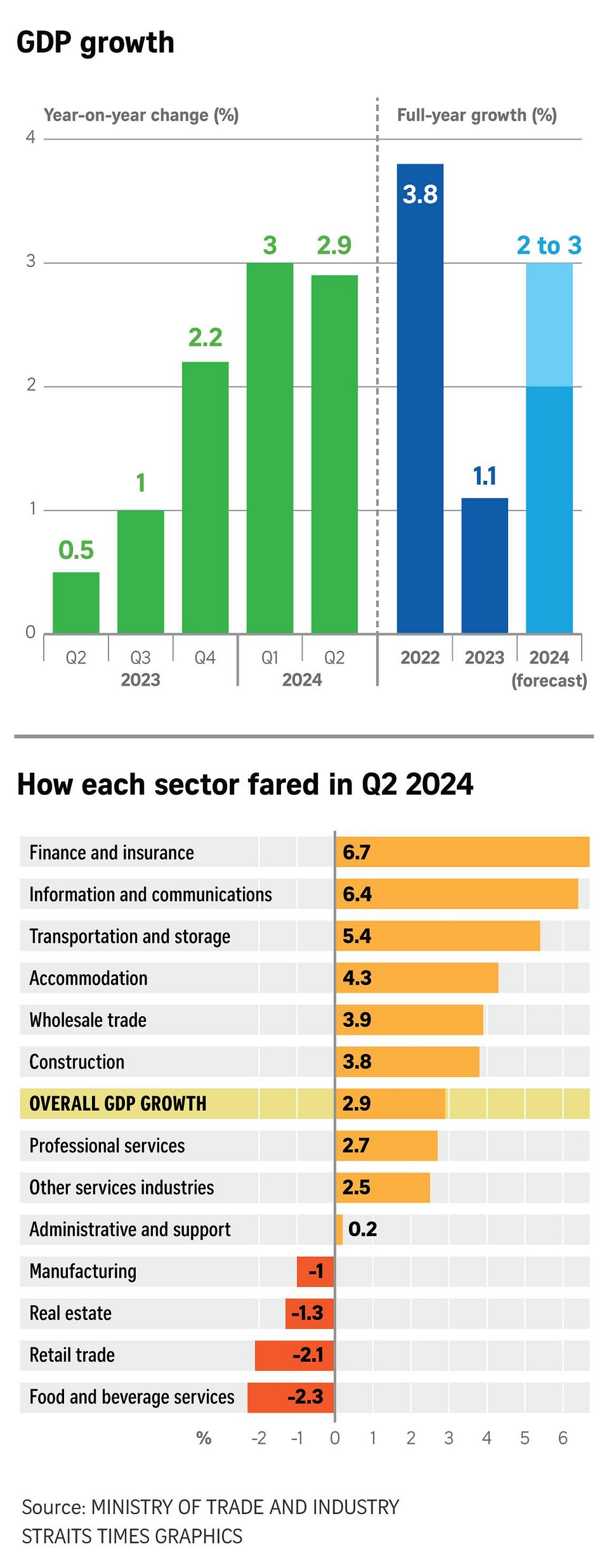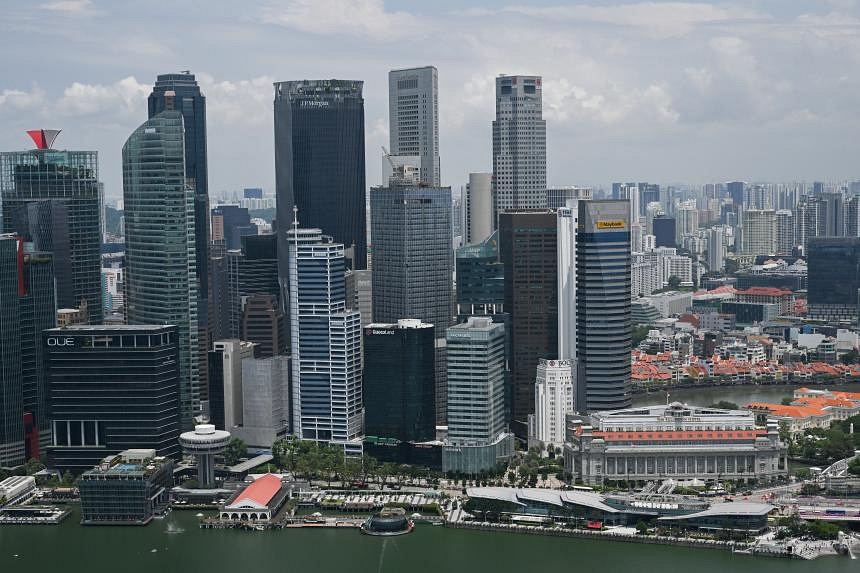SINGAPORE – Singapore’s economy is expected to stay resilient for the rest of the year, with growth now expected to come in at the upper end of the official forecast, although risks such as geopolitical conflicts remain.
The Ministry of Trade and Industry (MTI) on Aug 13 narrowed its 2024 growth forecast to 2 per cent to 3 per cent, from its range of 1 per cent to 3 per cent.
This was after taking into account the performance of the Singapore economy in the first half of 2024, as well as the latest global and domestic economic situations, MTI said.
For the first half of 2024, Singapore’s gross domestic product (GDP) growth averaged 3 per cent year on year.
MTI’s narrowed 2024 outlook is in line with that of the Monetary Authority of Singapore, which on July 26 had said GDP growth is likely to come in closer to its potential rate of 2 per cent to 3 per cent for the full year.
MTI chief economist Yong Yik Wei told the media that barring downside risks globally, growth is expected to stay at this trend rate of around 2 per cent to 3 per cent over the medium term, till around 2033 or thereabouts.
This is in line with Prime Minister Lawrence Wong’s remark in February’s Budget, when he said Singapore is aiming for annual growth of 2 per cent to 3 per cent on average over the next decade.
For the second quarter, the economy grew 2.9 per cent, unchanged from MTI’s advance estimate released a month ago. It follows first-quarter growth of 3 per cent – the fastest pace since the 4.2 per cent expansion in the third quarter of 2022.
On a quarter-on-quarter basis and seasonally adjusted, the economy expanded 0.4 per cent, matching the advance estimate and unchanged from growth in the first quarter.
Second-quarter growth was driven mainly by the wholesale trade, finance and insurance, and information and communications sectors, MTI said.
However, the manufacturing sector shrank, largely due to a contraction in biomedical manufacturing as pharmaceuticals output fell sharply.
The key electronics industry returned to growth, supported by strong demand for smartphones, personal computers and artificial intelligence-related chips, even as demand for automotive and industrial chips remained weak.
But consumer-facing sectors, such as retail and food and beverage services, shrank, partly due to an increase in outbound travel by locals.

MTI said that on balance, Singapore’s external demand outlook is expected to be resilient for the rest of 2024.
Mr Gabriel Lim, MTI’s permanent secretary for policy, said: “While GDP growth in the US and China is expected to ease gradually, GDP growth in the euro zone, Japan and key South-east Asian economies should improve.”
China’s economy is projected to expand at a slightly slower pace in the second half of 2024 as investment growth tapers amid signs of overcapacity in some sectors.
Nonetheless, as the property market is likely to stabilise with the roll-out of government support measures, consumer sentiments should start to improve, MTI said.
Growth in key South-east Asian economies is also projected to pick up slightly in the second half of 2024 in tandem with improvements in domestic demand, as well as the ongoing recoveries in global electronics and tourism demand.
“Nonetheless… downside risks in the global economy remain,” Mr Lim said.
MTI said geopolitical and trade conflicts intensifying could dampen business sentiments and add to production costs, which could weigh on global trade and growth.
Disruptions to the global disinflation process could also lead to tighter financial conditions for longer periods, and trigger market volatility or latent vulnerabilities in banking and financial systems, it added.
Against this backdrop, Singapore’s manufacturing sector is expected to see a gradual recovery in the second half of 2024.
In particular, the electronics cluster is projected to recover more strongly, supported by robust demand for smartphone, PC and AI-related chips. This will in turn boost the precision engineering industry.
The chemicals cluster is also expected to continue expanding, in part with higher production in petrochemicals and speciality chemicals.
In contrast, biomedical manufacturing is likely to contract, with pharmaceuticals output expected to stay weak for the rest of 2024.
Barclays senior regional economist Brian Tan said: “We continue to expect a relatively gradual – not robust – manufacturing recovery, though the performance is likely to remain bumpy and uneven.
“In particular, we maintain our view that the tech upcycle is broadening out of North Asia, where the AI boom has largely been playing out.”
The projected manufacturing recovery, particularly that of the electronics cluster, is expected to benefit trade-related services sectors such as the machinery, equipment and supplies segment of the wholesale trade sector, MTI said.
The continued recovery in air travel and tourism demand will support growth in the tourism- and aviation-related sectors such as accommodation and air transport, MTI added.
Growth in the finance and insurance sector should also remain robust, as global interest rate cuts continue to be implemented amid sustained disinflation, it noted.
OCBC Bank chief economist Selena Ling said analysts are keeping their 2024 full-year growth forecast of 2.6 per cent, which is closer to the upper end of the official growth forecast, “amid the recent green shoots in the global tech industry and relatively resilient growth in the construction and services sectors”.
“The second half of 2024’s growth momentum is tipped to improve due to the broadening tech upturn benefiting the manufacturing and financial sectors, while the domestic-oriented sectors should also normalise to pre-Covid-19 rates,” she said.
DBS Bank economist Chua Han Teng noted that Singapore’s improving economic growth in 2024 is driven by a recovery in labour productivity.
“The rebound in labour productivity will help to mitigate domestic labour cost pressures, which have been a major concern for Singapore’s businesses over the past two years in 2022 and 2023.”
He added that wage growth is likely to be contained, and, overall, there should be less passing on of business costs to consumer prices.


